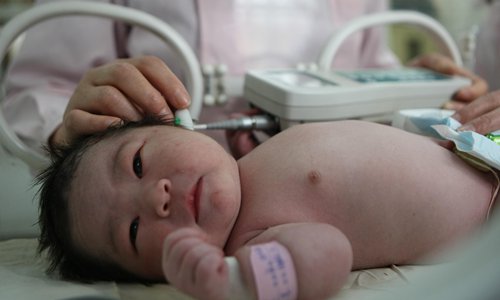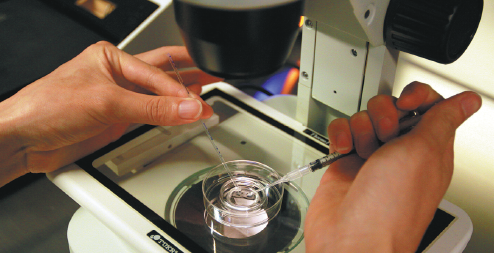
From the People's Daily App.
This is Story in the Story.
In China, there are 800,000 to 1.2 million babies born annually with birth defects, representing an average of one unhealthy child born every 30 seconds.
Infertility rates in China rose from 3 percent in 1992 to 12.5 percent in 2012.
China's first Birth Defect Prevention Day was recently launched in Beijing. The new awareness day was created to prevent birth defects by raising the public's awareness, publicizing knowledge, and advocating prenatal eugenic check-ups, and folic acid supplementation during pregnancy.
Many factors cause birth defects and include viruses, drugs, genetic factors, and micronutrient and nutrition deficiency during pregnancy that severely affect a mother’s health and child’s healthy development.
The National Health Commission said the health literacy of Chinese people has remained at 17 percent, and the level of those aware of birth defects is not high.
A growing number of Chinese families are paying more attention to the health of the next generation. For those who are without access to systematic health training, they must learn about maternal and child health care on their own. However, through increased national efforts, this is changing.
Today’s Story in the Story looks at how China is increasing birth defect prevention by helping parents safeguard their newborns against genetic diseases.

A nurse at the People’s Hospital in Huaibei, East China’s Anhui Province, screens a newborn for hearing. (Photo: VCG)
Cao Jing, a 37-year-old from Suzhou, Jiangsu Province, celebrated the birthday of her 3-year-old daughter - the first baby in the world born using a genetic technology that will allow the youngster to have trouble-free pregnancies when she is ready to become a mother.
The technique blocks the genetic transfer of a structural chromosomal abnormality to newborns that has an incidence rate of about 0.2 percent in untreated pregnancies.
Those with the abnormality often experience repeated miscarriages or have babies with birth defects when they become pregnant.
More than 20 healthy babies have been born at hospitals in China through this technology, said Sun Xiaoxi, vice-president of the Shanghai Ji Ai Genetics and IVF Institute.
The institute, which is affiliated with Fudan University, developed the technology.
This latest technological breakthrough in Shanghai has been reported by the medical journal BMC Medical Genomics in the UK.
"We're confident that this technique that originated in China will have a wider impact and benefit more infertile patients. Infertility is a rising health issue around the globe in relation to pollution, postponed childbearing age and pressure from life," Sun said.
In the early 2000s, China started to use the "third-generation" test-tube baby technique to assess and diagnose problems in the genetic makeup of embryos. This technique ensures that only embryos without genes that cause disease are moved into the mother's womb so that disease is not passed from one generation to the next.
The technique allows couples with rare or genetic diseases, or those with a high incidence of tumors in their families, to realize their dream of starting a family.

A scientist checks a frozen embryo at the Shanghai Ji'ai Genetics and IVF Institute. (Photo: China Daily)
But the technique is still imperfect in certain ways, including that of Cao, the Suzhou mother, as the embryo selected to be placed in her womb had a 50 percent chance of being a disease carrier.
"If the embryo is a disease carrier, the infant in later life may be at risk of repeatedly miscarrying or giving birth to a deformed child," Sun said.
Cao experienced three miscarriages 50 to 70 days after conceiving between 2010 and 2012. A DNA screening later found she had a structural chromosomal abnormality.
"My mother had two miscarriages before I was born, but we never thought it was related to recessive heredity," she said.
At the Shanghai institute, 11 effective embryos were obtained for Cao in 2015. By using the innovative technique, one healthy embryo with no risk of being a disease carrier was selected, meaning that genes carrying hereditary diseases could not be passed on.
In February last year, the institute set up an alliance - which to date includes 22 hospitals in Jiangsu, Anhui, Shandong, Jilin and Guangdong provinces - to extend the technology to more patients.
Shanghai Jiao Tong University School of Medicine said, "If there are breakthroughs, it will greatly benefit a wide range of patients in the world."
(Produced by Nancy Yan Xu, Lance Crayon, Brian Lowe, and Paris Yelu Xu. Music by: bensound.com. Text from China Daily and Global Times.)


